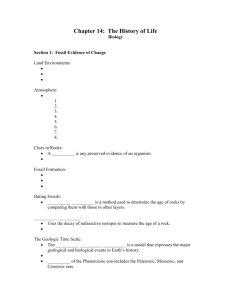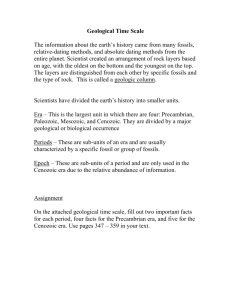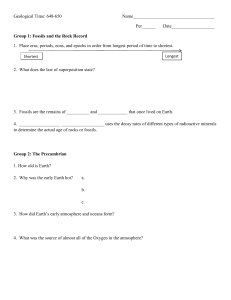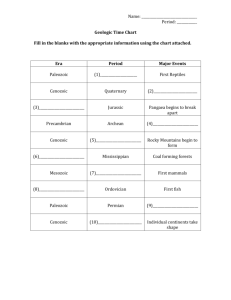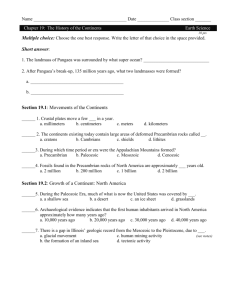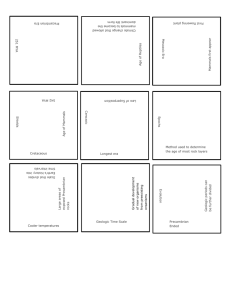17-3 Evolution of Multicellular Life
advertisement
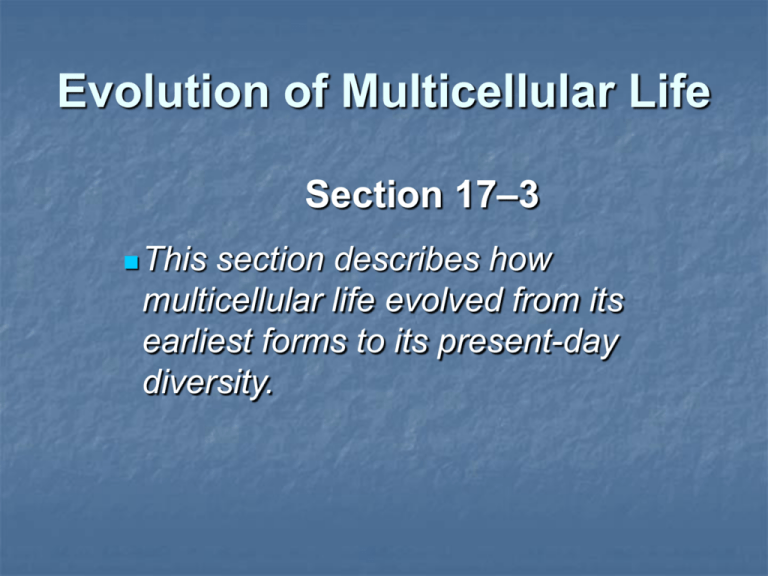
Evolution of Multicellular Life Section 17–3 This section describes how multicellular life evolved from its earliest forms to its present-day diversity. Precambrian Time Is the following sentence true or false? Almost 90 percent of Earth’s history occurred during the Precambrian. TRUE Precambrian Time Circle the letter of each sentence that is true about life in the Precambrian. Anaerobic and photosynthetic forms of life appeared. Precambrian Time Aerobic forms of life evolved, and eukaryotes appeared. Multicellular life forms evolved. Precambrian Time Life existed on the land and in the sea. Precambrian Time Why do few fossils exist from the Precambrian? The animals were all soft-bodied. Paleozoic Era The first part of the Paleozoic Era is the _____Period. Cambrian Era Paleozoic Era Is the following sentence true or false? Life was not very diverse during the Cambrian Period. false Paleozoic Era Circle the letter of each sentence that is true about the Cambrian Period. a. Organisms with hard parts first appeared. b. Most animal phyla first evolved. d. Brachiopods and trilobites were common. Paleozoic Era Match the periods of the Paleozoic Era with the evolutionary events that occurred during them. Paleozoic Era Animals first begin to invade the land during the ______Period. Devonian The History of Life Where does the Carboniferous Period get its name? Vast swampy forests, giant ferns and other plants that grew during that time formed thick deposits of sediment that changed into coal over millions of years. The History of Life When many types of living things become extinct at the same time, it is called a(an) mass extinction The History of Life Is the following sentence true or false? The mass extinction at the end of the Paleozoic affected only land animals. false Mesozoic Era Complete the compare-and-contrast table. PERIODS OF THE MESOZOIC ERA The History of Life The Mesozoic Era is called the Age of REPTILES . The History of Life The first dinosaurs appeared in the___ Period. Triassic The History of Life Is the following sentence true or false? The mammals of the Triassic Period were very small. true The History of Life Is the following sentence true or false? Many paleontologists think that birds are close relatives of dinosaurs. true The History of Life The dominant vertebrates throughout the Cretaceous Period were ____. reptiles The History of Life What advantage do flowering plants have over conifers? Their seeds are enclosed in a fruit, which protects the seed and aids in dispersing it to new locations. The History of Life Describe the mass extinction that occurred at the end of the Cretaceous Period. More than half of all plant and animals groups were wiped out, including all of the dinosaurs. Cenozoic Era Is the following sentence true or false? During the Cenozoic Era, mammals evolved adaptations that allowed them to live on land, in water, and in the air. true Cenozoic Era The Cenozoic Era is called the Age of _______. Mammals Cenozoic Era What were Earth’s climates like during the Tertiary Period? They were really warm and mild. Cenozoic Era How did Earth’s climate change during the Quaternary Period? First it cooled causing a series of ice ages. Then, it began to warm again. Cenozoic Era Is the following sentence true or false? The very earliest ancestors of our species appeared about 100,000 years ago. FALSE
